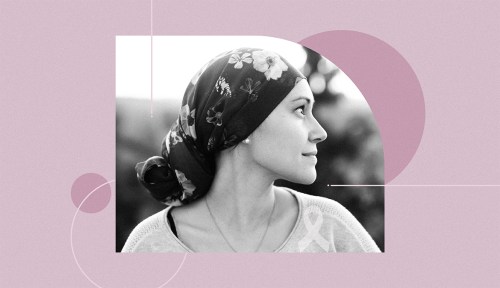‘I’m a Breast Cancer Survivor, and I’ve Decided To Get Regular Pancreatic Cancer Screening’
A breast cancer survivor chats with an expert and opens up about her choice to enroll in regular pancreatic cancer screening.

I arrived at the hospital radiology lab for my first pancreatic cancer screening nervous but determined. I removed my earrings, watch, and bra—anything containing metal—and slid into a faded hospital gown that tied in the back. The nurse led me to the exam room, and I climbed onto the rolling bed. I was officially at the mouth of the MRI tube meant to take images of my organs.
“Have you had an MRI before?” the tech asked as he adjusted the intravenous drip that would deliver contrast dye into my veins.
“Yeah,” I replied with a rueful laugh. “I’ve had a few.”
I first rolled into a clanging MRI machine five years before this moment, shortly after being diagnosed with breast cancer. At the time, I was still breastfeeding my son, and cancer hadn’t been on my radar.
I was only 37 when diagnosed, so my oncologist ordered genetic testing. It revealed that I carry the BRCA2 gene mutation—an abnormality in the gene that, under normal circumstances, produces proteins that work to prevent cancer. Instead, the BRCA2 mutation gives me a higher-than-average risk of developing cancer.
I completed treatment—chemotherapy and a bilateral mastectomy to reduce my risk of cancer recurring in my breasts—and received the best possible outcome: a prognosis of “no evidence of disease.” And, while I felt relieved that I’d finished treatment, I knew my bout with cancer was far from over.
Not only had the BRCA2 gene hastened my breast cancer, but it also put me at higher risk of other cancers such as ovarian and pancreatic. With the BRCA mutation, my body felt like a ticking bomb, and I worried about what tumors might appear next. So, I underwent a preventative oophorectomy to remove my ovaries and fallopian tubes to reduce my risk of developing ovarian cancer. And this year, I took another step: I enrolled in a pancreatic screening program at the urging of my oncologist.
Pancreatic cancer is rare but particularly insidious. It often goes undetected until it reaches an advanced stage. In the general population, there’s only a 1 percent chance of getting pancreatic cancer, but according to the American Society of Clinical Oncology, BRCA2 gene mutation carriers have a 5-10 percent higher likelihood of developing it. Plus, both my grandmother and great-grandfather had it.
Those two factors—BRCA2 gene and my family history change standard pancreatic screening recommendations, says Alicia Latham, MD, medical geneticist, and family medicine physician, Memorial Sloan Kettering Cancer Center.
Pancreatic cancer screenings generally involve two types of tests, MRI and endoscopic ultrasound. The MRI is pretty straightforward, a scan of the abdomen, focusing on the pancreas and other nearby organs such as the liver and stomach. With the endoscopic ultrasound, the patient usually receives a sedative and has a thin tube inserted down the throat with an endoscope that uses high-frequency sound waves to produce detailed images of the lining and walls of the pancreas and liver.
These tests can be done separately, or in combination, Dr. Latham explains. In my case, my doctor advised conducting both tests, rotating between the two procedures every six months.
My gastroenterologist and oncologist work together, consulting on my results and making determinations for next steps when necessary. I know that should one of these screens find an abnormality, both doctors will be there to assess the risk of further testing and guide me on the best way to proceed.
“Whenever you order a test, you need to know how to deal with the possible results,” Dr. Latham says. “You want to have physicians and experts available to interpret results and advise next steps. Anytime you’re doing imaging and screening with a patient, you want to maximize benefit with the risk.”
Embarking on pancreatic cancer screening involves invasive and often expensive procedures, and Dr. Latham cautions that it may not be worth it for everyone. “Just because you have a BRCA mutation, it doesn’t mean you have a guarantee of cancer,” Dr. Latham says. “I want people to realize that, yes, you may be at increased risk, but it’s not a guarantee. The screening is not perfect, and the best thing you can do is talk to your doctor and have that open dialogue.”
I’m fortunate to live in a city with an extensive health system, so I have those resources available to me. I’ve also lived through cancer once, and I know early detection can make a huge difference. The cavernous clanging MRI, the clinical environments, and the waiting for results is stressful—but my first MRI showed clear imaging, and that knowledge is deeply reassuring.
Oh hi! You look like someone who loves free workouts, discounts for cutting-edge wellness brands, and exclusive Well+Good content. Sign up for Well+, our online community of wellness insiders, and unlock your rewards instantly.










